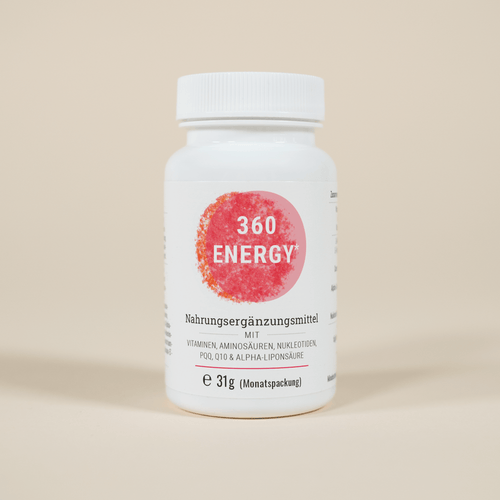Themen dieses Blogartikels:
What is alpha lipoic acid?
Alpha-lipoic acid, sometimes also spelled α-lipoic acid, is a sulphur-containing fatty acid produced naturally in the body that also has vitamin-like properties.1 Its sulphur atoms are linked together in a ring structure. As a coenzyme, alpha-lipoic acid is found in the mitochondria. An alternative name is thioctic acid.
What functions does alpha lipoic acid have?
Alpha-lipoic acid plays an important role in energy metabolism. As a cofactor, it is involved in various mitochondrial cell reactions. The sulphur-containing fatty acid can transfer electrons as well as hydrogen and acyl residues.2 It has strong antioxidant properties and can protect your cells from damage caused by free radicals as a radical scavenger. Alpha lipoic acid can also promote the elimination of toxins such as lead or mercury.3
What makes alpha lipoic acid unique?
Thanks to its sulphur content, alpha lipoic acid is both fat and water soluble. This chemical property distinguishes it from other antioxidants and makes it the most important antioxidant in the human body.4 It can cross the blood-brain barrier and helps to improve the blood supply to nerve cells.5
How much alpha lipoic acid do you need per day?
It is now considered certain that alpha-lipoic acid is a so-called conditionally essential nutrient. This means that the body of healthy people can produce sufficient quantities of this vitaminoid itself. The starting materials are octanoic acid and cysteine, which are converted to alpha-lipoic acid by means of de novo synthesis.6
When do you particularly need alpha lipoic acid?
Doctors use alpha-lipoic acid to treat paresthesia in diabetic polyneuropathy, i.e. nerve damage and sensory disturbances caused by long-term diabetes. The sulphur-containing fatty acid can also help in the treatment of heavy metal poisoning: It forms a bond with the metal ions and virtually deactivates them.7 Alpha lipoic acid can also support drug treatment in cases of dementia, cancer and chronic fatigue.8
How does a alpha lipoic acid deficiency develop and how does it manifest itself?
As the body is normally able to produce enough alpha-lipoic acid, a deficiency of this nutrient is rare. However, certain life circumstances can lead to an increased requirement. For example, heavy smokers, alcoholics and people suffering from diabetes mellitus, Alzheimer's disease or multiple sclerosis can develop a deficiency.9 The possible consequences can be a loss of energy and performance.10
What happens in the event of an overdose of alpha lipoic acid?
To date, there are no binding maximum amounts for the intake of alpha-lipoic acid.11 Known side effects of taking this micronutrient include gastrointestinal complaints, allergic reactions and an altered sense of taste. Diabetics in particular should not take food supplements containing alpha-lipoic acid without consulting their doctor, as the substance can increase the effect of blood sugar-lowering medication. This can lead to hypoglycaemia.12
Which foods contain particularly high levels of alpha lipoic acid?
You can also get alpha lipoic acid from food. The micronutrient is found in various plant and animal foods, including spinach, broccoli and tomatoes as well as meat and offal.13
This encyclopedia entry is based on carefully researched sources:
Bibliography & Sources
- infothek-gesundheit.de/alpha-liponsaeure-funktion-effekten-und-applications/
- flexikon.doccheck.com/de/Alpha-Lipons%C3%A4ure
- imd-berlin.de/special-competences/az/micronaehrstoffe/alpha-liponsaeure
- wassenberg-apotheke.de/gesundheitsbibliothek/index/alpha-liponsaeure/
- gelbe-liste.de/wirkstoffe/-Liponsaeure-Ethylendiamine-Salz-2-1_52035
- imd-berlin.de/special-competences/az/micronaehrstoffe/alpha-liponsaeure
- gelbe-liste.de/wirkstoffe/-Liponsaeure-Ethylendiamine-Salz-2-1_52035
- wassenberg-apotheke.de/gesundheitsbibliothek/index/alpha-liponsaeure/
- vitamindoctor.com/naehrstoffe/sonstige-substanzen/alpha-liponsaeure
- Schnelleinfachgesund.de/alpha-liponsaeure/
- infothek-gesundheit.de/alpha-liponsaeure-funktion-effekten-und-applications/
- klartext-futterrgaenzung.de/wissen/lebensmittel/futterrgaenzmittel/wechsel-und-nebeneffekt-gegenanzeige-was-futterrgaenzung-verschweigt-50991
- imd-berlin.de/special-competences/az/micronaehrstoffe/alpha-liponsaeure
















